This age-old recipe for preserving spicy peppers in vinegar, handed down from the past, requires only two ingredients: spicy peppers and plain, cold vinegar. These pickled hot peppers can last for years in jars and serve as a flavorful addition to soups and stews.
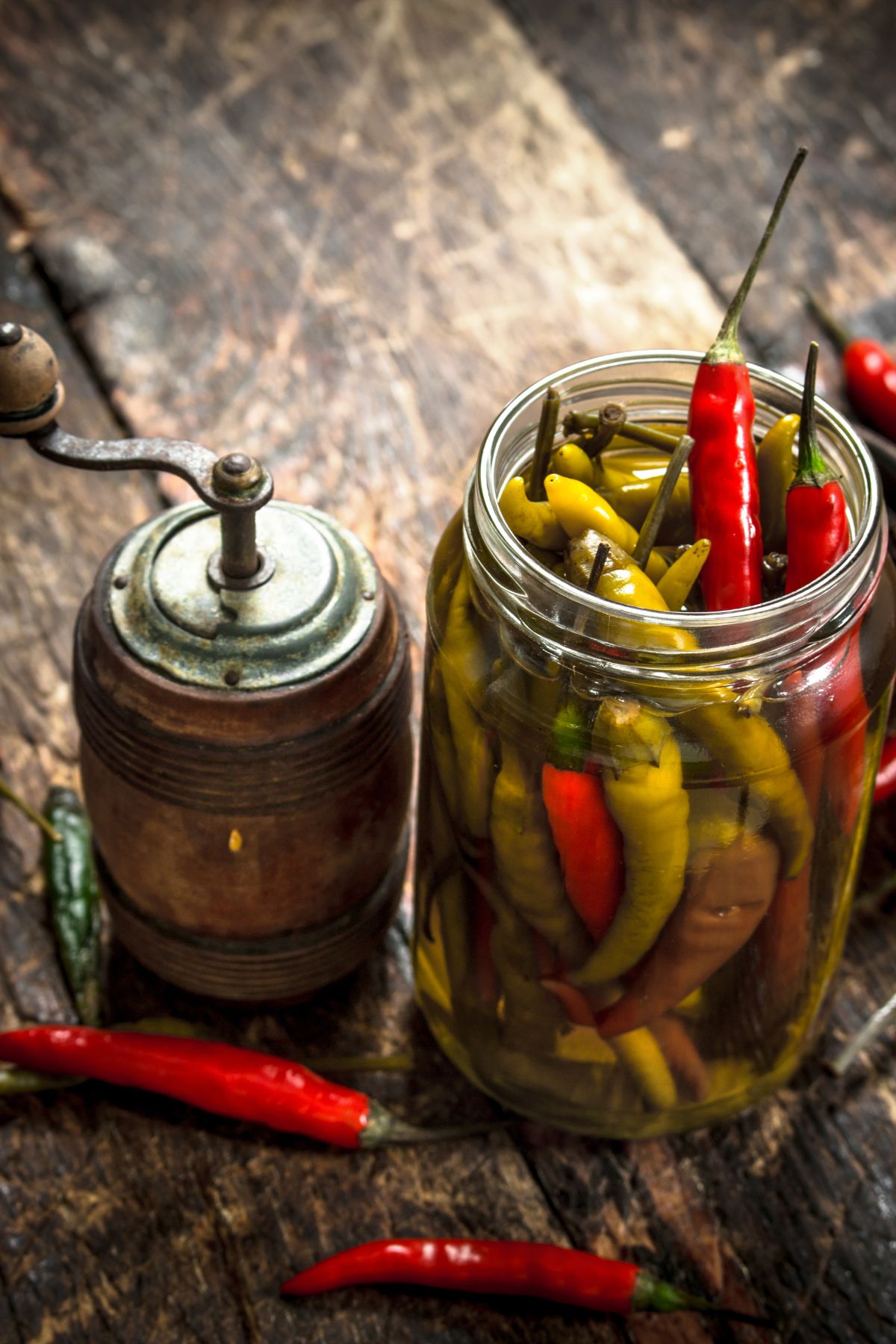
Pickling peppers is a great way to preserve peppers when you can't eat them all at once. This recipe uses a simple process of pickling that doesn't require any cooking or heating and only a few minutes to prepare.
This hot peppers recipe is part of my canning collection. If you like this recipe, you might also like this article about how to salt preserve herbs, where I show you a great technique to preserve beautiful dill or other herbs for the cold season.
Also, this Red Peppers in Mustard Sauce recipe is a great way to preserve red peppers and serve them with roasted meats in winter. And finally, let's not forget about my Pickled Cucumbers In Vinegar , this super easy recipe to use for making pickles.
Jump to:
What is Cold Vinegar Preservation?
This pickling process differs from traditional canning, which requires heating or cooking the jar under pressure and where jars make a 'pop' sound upon opening. Instead of hot water bath processing, we use cold vinegar so the jars don't seal in the same way.
Using only vinegar, it's an easy way to preserve the peppers for years without needing a vacuum seal. Just ensure your jars are clean and closed tightly before storing and your peppers will remain well-preserved, providing you with a delicious way to add heat to dishes for years, even without the 'pop'.
⭐️ NOTE: This particular recipe for preserving peppers is meant for spicy peppers that serve as condiments for winter soups and stews. It is NOT intended for bell peppers, cauliflower, carrots, beans, or cucumbers. For other uses, you might need to seek other preservation methods, as this recipe might not suit your needs.
Why You Will Love This Hot Peppers Recipe
- Easy Preparation! The jars don't require a water bath because the vinegar effectively eliminates botulism as long as you use a vinegar with at least 5% acetic acid.
- A Simple Way to Add Heat Throughout the Year. I follow this process every autumn to preserve spicy peppers. These peppers are a fantastic way to add a bit of heat to any soup or stew, like this traditional Saxon potato tarragon soup.
- Long Lasting Method. When they're stored properly, your preserved peppers can last for years on the shelf.
- Give Them Away. The vibrant and colorful jars make great holiday gifts for family and friends.
Ingredients
To make these canned hot peppers, you need only two simple ingredients. Here's a brief look at what you need.
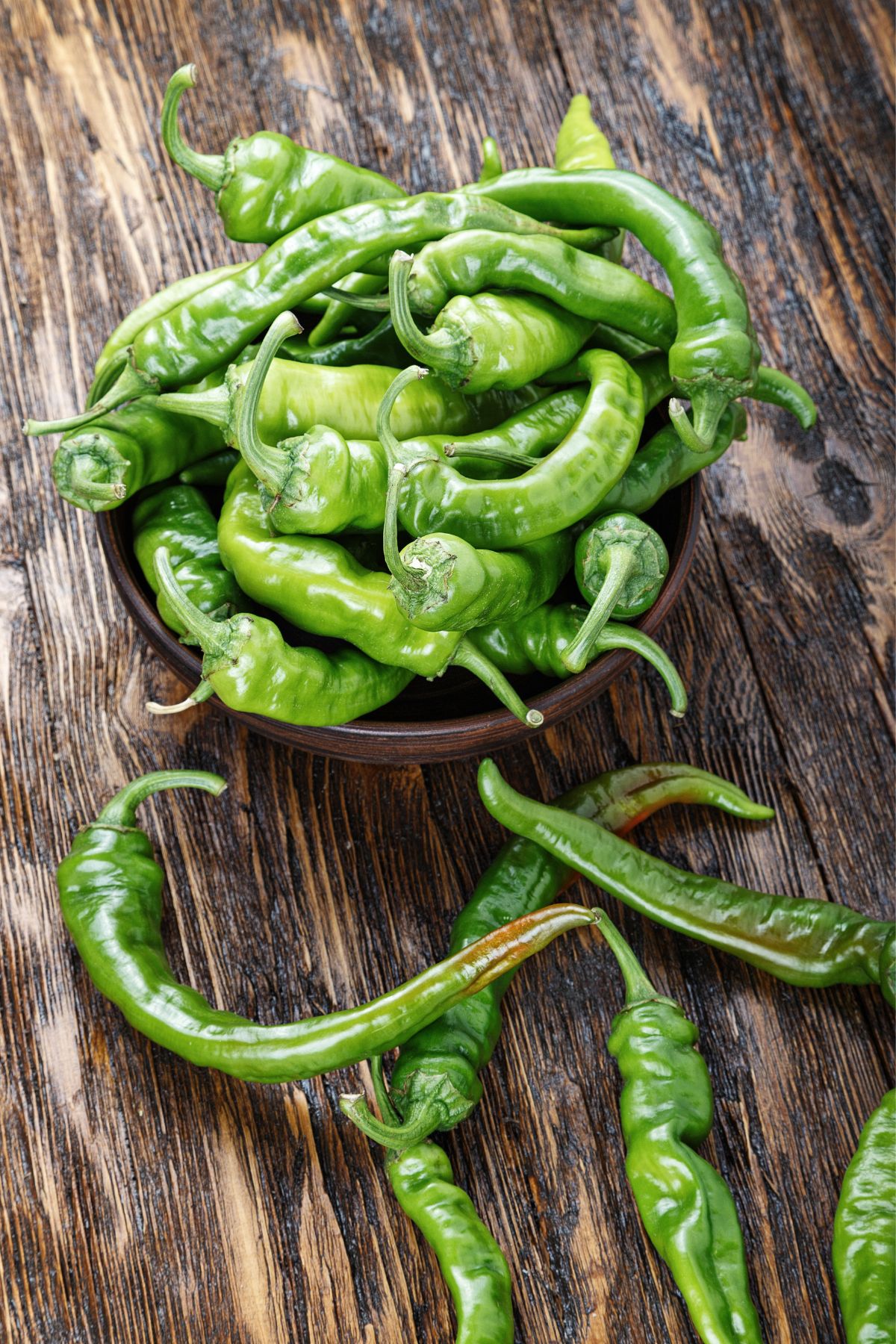
- Hot peppers: There's a wide variety of spicy peppers that work well in this hot pepper recipe! See below to pick your favorites.
- Vinegar: White wine vinegar or apple cider vinegar work great, though you can use any type of vinegar that contains at least 5% or more acidity.
- Jars: You will need to have Mason jars or the equivalent with screw top lids for this pickling recipe.
🌶️ What kinds of hot peppers are best for cold pickling?
There are many varieties of peppers suitable for making easy pickled peppers. It works well with both large and small peppers. I've listed a few:
- Jalapeno peppers
- Fresno chili peppers (not the Fresno Bell pepper)
- Serrano peppers
- Habanero peppers
- Cayenne peppers
- Thai (Bird's eye chili peppers)
- Aleppo peppers
- Shishito peppers
- Tabasco peppers
- Ghost peppers
- Hungarian Wax peppers
- Dutch Red chili peppers
- Peri-Peri peppers
- Scotch Bonnet peppers
- Banana peppers
How to Make Canned Hot Peppers
There are a few important steps that you will want to follow when using this method of canning. It's a simple recipe, but here's a look at the process.
- Clean the jars. The jars need to be sterilized before you can add the peppers. Place the jars in a large pot of boiling water for ten minutes. Once they're sterilized, remove and drain the jars one at a time.
- Wash peppers. Be sure to remove leaves and dirt from the peppers. If you notice any peppers with dark blemishes, you will want to remove them.
- Pack peppers into jars. Place the peppers in the jars, packing them in gently so that they fit tight inside. You can do this with whole or sliced peppers. I like to use whole peppers if they're small enough, while large peppers might work better sliced.
- Add the vinegar. Pour the vinegar over the peppers, covering them completely, and fill all the way up to the top of the jar. Add the lid and tighten the screw band on the jar.
- Let them sit. The peppers need to sit in vinegar for at least one month before they are ready to be consumed.
How to Store
Store your jars of hot pickled peppers in a cool pantry, cellar, or unheated basement. They need to be kept cool and not exposed to sunlight or too much warmth.
After opening a jar, they must be stored in the refrigerator. While vinegar is a great preservative, it's a good idea to throw them out once they've been sitting in the fridge for a few months.
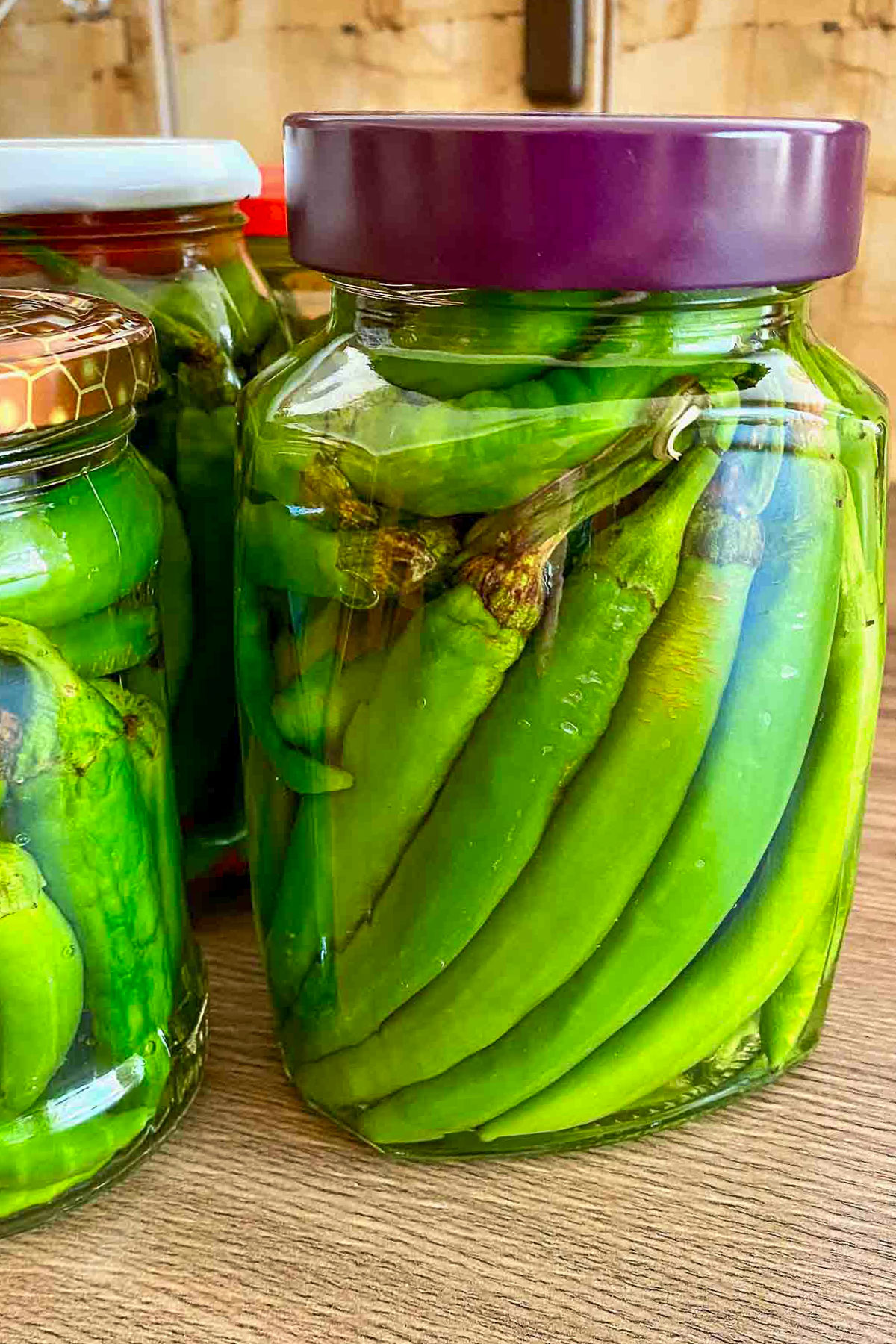
How to Serve Hot Peppers
These pickled peppers make a fantastic addition to soups and stews. Serve a jar of hot peppers next to these hearty soups and stews. They can be eaten whole and enjoyed along with the soup or sliced and added to the soup. It all depends on how spicy you prefer your food.
Soups:
- Smoky Black Bean Soup
- Beef Vegetable Soup
- Chicken Soup With Sour Cream And Garlic
- Romanian Meatballs Sour Soup
Stews:
You can even use the juice! The flavored vinegar can also be added to soups, marinades, sauces, or dressing to add a bit of spiciness.
The peppers can be sliced and added to tacos or sandwiches, as a topping to pizza, in salads, or as an extra heat for grilled meats, fish, or even eggs.
Expert Tips
Several readers inquired about the preservation process for this easy recipe.
- The jars must be clean before filling. Wash them with warm water and soap or run them through a dishwasher cycle. Sterilize them thoroughly. If you need more information about the process check here for more about the sterilization process.
- Sterilize the lids separately. Avoid placing them with the jars in the same pot. I usually clean them with warm water and soap, dry them well, and then submerge them in boiling water for at least 2 minutes.
- Use new lids. If any lids seem old or rusty, you will need to replace them. While recent guidelines no longer recommend boiling lids, I suggest submerging them in hot water for a few minutes before use for added safety. You can learn more about the new canning guidelines if you're interested.
- Cover with vinegar. The peppers and their stems should be fully covered with vinegar. Use vinegar with at least 5% acidity, and do not dilute the vinegar solution. Vinegar effectively combats botulism, so it's crucial to follow the recipe accurately.
- Cleaning the peppers. Wash the peppers and leave their stems left intact. While you can trim the stems, there's no need to remove them completely. If you decide to slice the peppers, it's a good idea to wear plastic gloves to prevent transfer of the spicy juices to your fingers.
- Do not add other ingredients. Adding extra ingredients such as herbs, spices, or other vegetables will change the recipe. It's best that you find a recipe that includes these additions.
- No boiling. This process uses cold vinegar, so note that you will not need to boil or heat the vinegar.
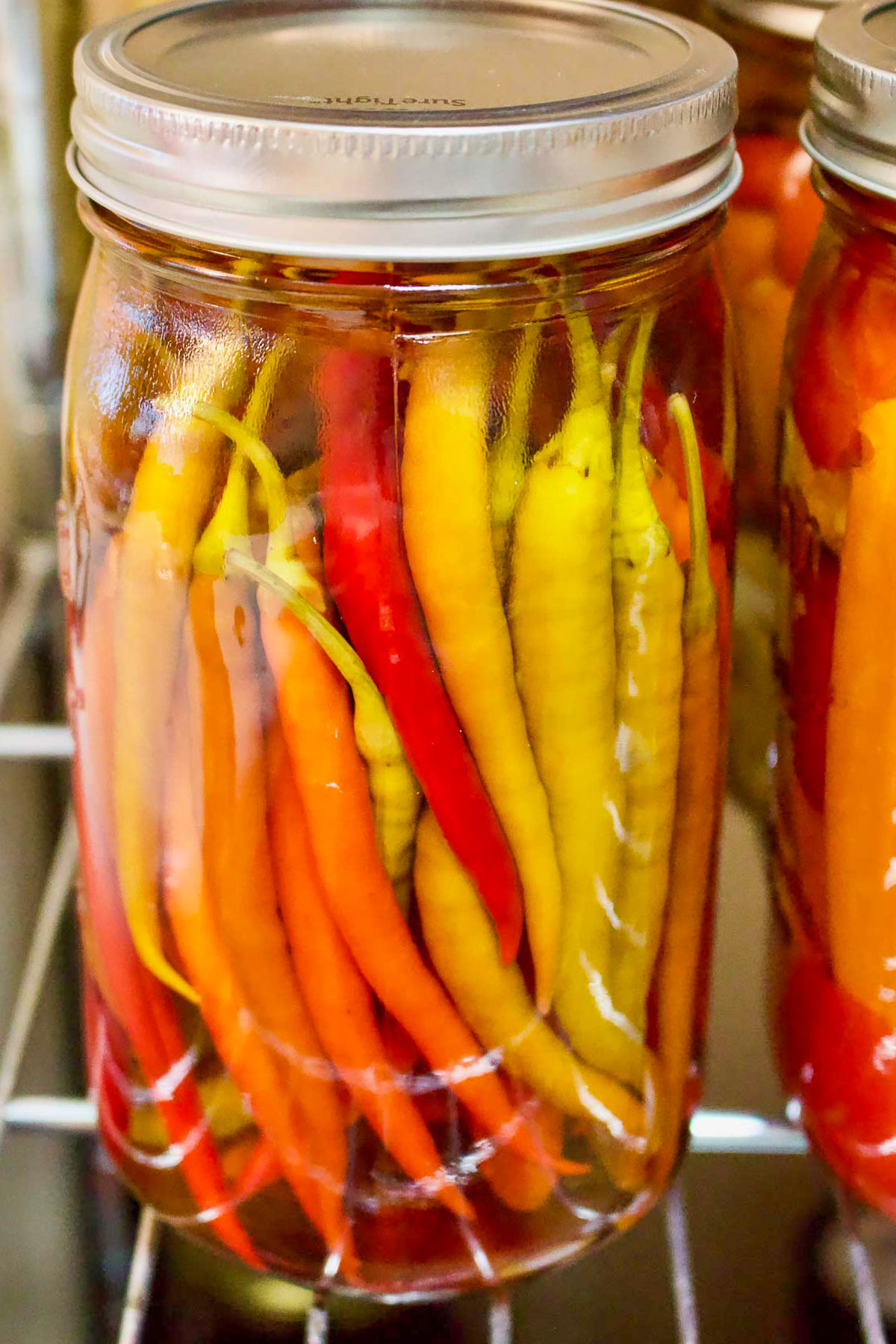
Frequently Asked Questions
Here are answers to some of the most frequently asked questions:
No, the jars do not need either process, as the vinegar prevents fermentation. The peppers can be preserved for years without any issues. Simply sterilize the jars before filling them.
No, I do not put them together with the jars. I clean them in warm water with soap and dry them well. Then, I boil some water and add the lids to sit in the hot water for two minutes.
The new guideline does not even recommend boiling the lids, but for my peace of mind, I think you should place them in hot water for at least a few minutes before you use them. Here is a link to the guidelines on boiling lids for canning if you want to read more.
Unfortunately, no, you can't do that. This is a canning method and not for quick pickles or refrigerator pickles. The results would be peppers at different stages of the pickling process. This will also create a great environment for bacteria to develop because you keep opening the sterilized jar to add more peppers.
The best solution is to use small pint jars and cut the recipe in half or a quarter to preserve a small batch of peppers. Other options to preserve peppers are to dry or freeze them.
For best results, pack the peppers into the jar either right up next to each other or, if sliced, fill the jar. Pack them tightly, but be gentle and avoid crushing them. This will keep them from floating in the jar.
Pin This For Later
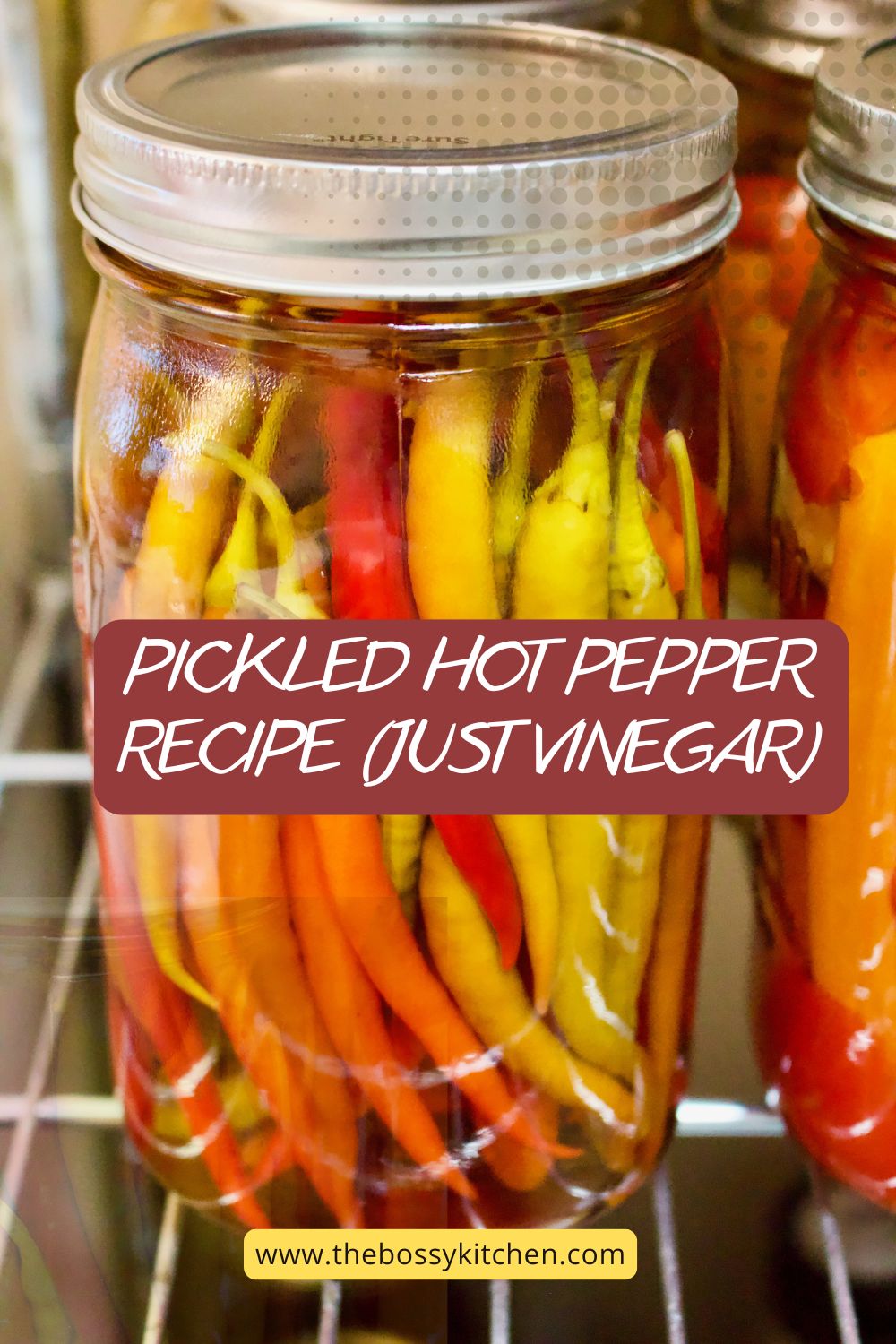
More Canning and Pickling Recipes
📖 Recipe
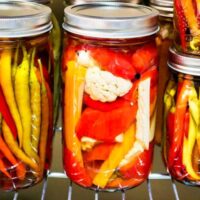
Canning Hot Peppers in Vinegar - Easy Recipe
Ingredients
- 1 pound hot peppers
- 14 ounces white wine vinegar or apple cider vinegar with at least 5% or more acidity
- sterilized jars and lids
Instructions
- Clean the jars. The jars need to be sterilized in a boiling water bath for 10 minutes in a pot of water on the stove.
- Wash and clean the hot peppers. Remove leaves, dirt and any bad peppers. Slice peppers if desired though I prefer leaving them whole.
- When the sterilizing time is up, remove and drain the hot jars one at a time.
- Place peppers in jars, packing them in and adding as many as possible until they fit tight inside.
- Pour vinegar over them to fill up the jars. Add lids, and tighten screw bands.
- The peppers need to sit in vinegar for at least one month before they are ready to be consumed.
- Great with soups or as a condiment in stews. Prepared peppers last in a cool place for years.
Video
Notes
- The jars must be clean before filling. Wash them with warm water and soap or run them through a dishwasher cycle. Sterilize them thoroughly. If you need more information about the process check here for more about the sterilization process.
- Sterilize the lids separately. Avoid placing them with the jars in the same pot. I usually clean them with warm water and soap, dry them well, and then submerge them in boiling water for at least 2 minutes.
- Use new lids. If any lids seem old or rusty you will need to replace them. While recent guidelines no longer recommend boiling lids, I suggest submerging them in hot water for a few minutes before use for added safety. You can learn more about the new canning guidelines if you're interested.
- Cover with vinegar. The peppers and their stems should be fully covered with vinegar. Use vinegar with at least 5% acidity and do not dilute the vinegar. Vinegar effectively combats botulism, so it's crucial to follow the recipe accurately.
- Cleaning the peppers. The peppers should be washed and cleaned with their stems left intact. While you can trim the stems there's no need to remove them completely. Wear gloves if you're slicing the peppers and wash hands immediately following handling them.
- Do not add other ingredients. Adding extra ingredients such as herbs, spices, or other vegetables will change the recipe. It's best that you find a recipe that includes these additions.
- No boiling. This process uses cold vinegar so note that you will not need to boil or heat the vinegar.

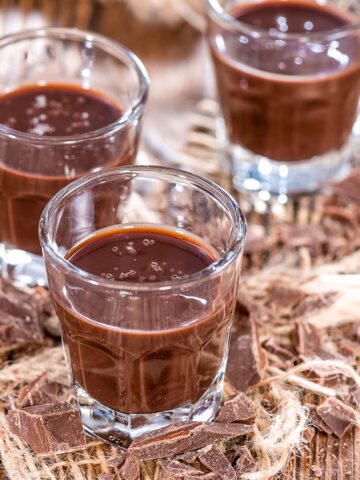
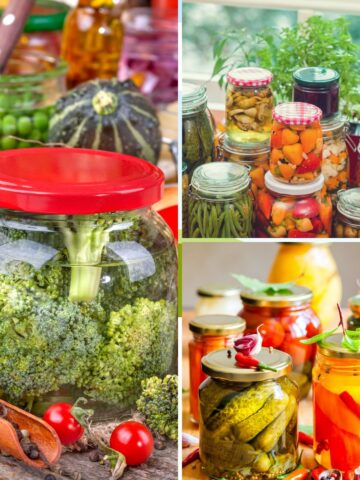
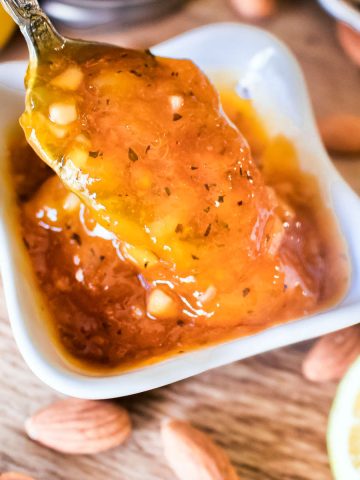
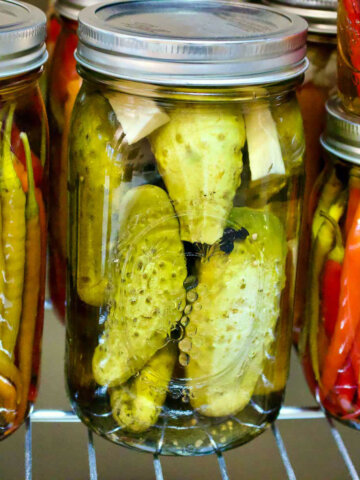
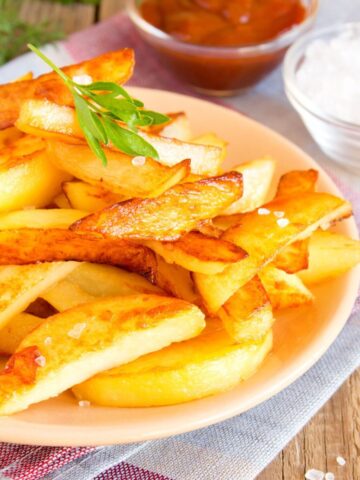
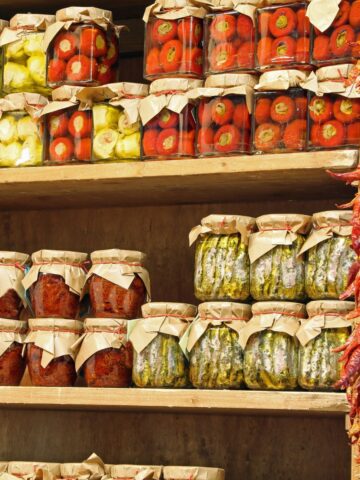
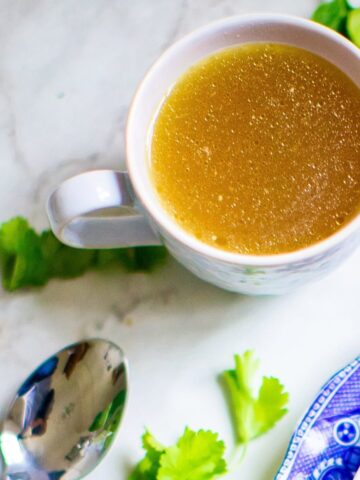
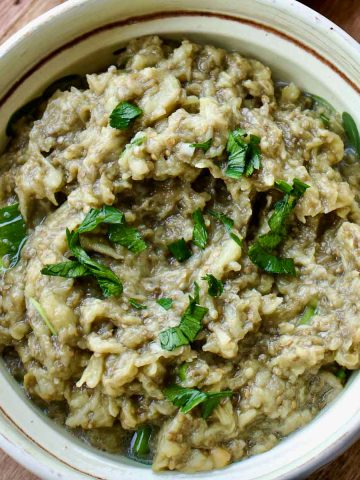
Ron Jackson says
Hi. I enjoy your comments. I canning VERY hot peppers in small mason jars. Pint size I believe. Is there anything special I need to do with the peppers? I know to wash and clean them, but was curious if they need to soak somehow first? I’m not going to cut them .... but put in the jars whole. Thanks for any suggestions .....
The Bossy Kitchen says
You do not have to do anything, just follow the recipe. Wash, clean the peppers, sterilize the jars, then just fill up the jars with hot peppers and pour vinegar over them. Make sure they are covered with vinegar. Close the jars and let them sit for about a month. They don't need to be soaked on anything. There is, really, nothing easier than this one. 🙂
Sandi Jammes says
I can't wait to try this recipe! Can't imagine anything easier! I just have a couple of questions.
1- is this going to taste similar to the vinegar/pepper bottles you find on tables in southern restaurants? Great on greens, etc.....
2 - Do you have a recipe for "Hot Giardiniera". You know... hot cauliflower, carrots, celery, etc. It's become my "drug of choice" for snacking to keep calories, sugar, etc low.
Thanks in advance. Excited to try your recipes out.
The Bossy Kitchen says
Hi Sandi, I am not sure how the southern peppers taste as I never had them before. However, try the recipe and see if you like it or not. I still have hot peppers preserved like that since last year. I made few jars and they last for years.
I do not have a recipe for :Hot Giardiniera" on the blog, but I am working on putting one on the blog for the fall. Thank you for visiting and happy pickling hot peppers! 🙂
CY says
I understand that it’s not in your recipe, but Would it be ok to add something like garlic or oregano to this?
The Bossy Kitchen says
Hi, I never tried to add anything else to the recipe because it works for me the way it is. You can add stuff and see how it works for you. If you don't like it, next time you do it differently. Feel free to experiment! Thank you for visiting!
Mark Fradl says
Hi, thanks for the great recipe! My question is, down the road when you open a jar to get some of the pickled peppers do you need to then refrigerate the rest of the jar since it has been opened? And do you know how long the open jar will last?
The Bossy Kitchen says
Hi Mark,
Yes, I would refrigerate the opened jar. I keep mine in the fridge as well, and the unopened ones in the pantry, in a cool place. They last a long time, vinegar is a great preservative. I throw them away in the summer, if they end up sitting in the fridge for few month and make a new batch when the hot peppers are available at the Farmers Market. I live in Minnesota, where our growing season is extremely short, so I can hot peppers in August-September and start consuming them late in November when it gets cold and the rest of the winter(which is very long here). I hope this answers your questions.
Mark Fradl says
Very helpful, thank you! Ya, I'm in Texas so we can actually do things year round (winter is our time for broccoli, cauliflower, and greens)
Cecilia says
I used to do this recipe for years but with onions, garlic and salt added. After years of not canning I grew Marchant peppers this year. Do you think I could use cleaned chilled garlic instead of peeling fresh? It would sure save a lot of time. I know this is not your way but the results are like the Bruno peppers that are so expensive in the store now. I like your site. Thank You
The Bossy Kitchen says
Hi Cecilia, if you want to make my recipe, then you do not need to add anything to it. I cannot advise you on adding one ingredient or another, as I never experimented with other things. I like the recipe as it is and I make it every year. It is so easy, why would I complicate it? I also never used that type of garlic, so I have no idea how it would behave in the jar.
Vickie Becker says
Can you or should you add canning spice to the jars?
The Bossy Kitchen says
Vickie, please read the post again. There is no need to add anything. Believe it or not, the recipe is correct. I did not forget to add ingredients. 🙂
Hal Rymel says
How long will the peppers last, on the shelf?
The Bossy Kitchen says
Hi, Please read the article. You will find all the answers you might have, including this one.:-)
Virginia says
Is this recipe for regular banbana pepper
The Bossy Kitchen says
No, just for the small, long, spicy ones.
Virginia says
Do u have a easy one for banana pepper
The Bossy Kitchen says
Sorry, I do not have one, but I am sure you can find one online.
Thomas says
Hello, can I use Ghost Peppers and Carolina Reaper peppers? Thank you.
The Bossy Kitchen says
Hi, I have no experience with these types of peppers, so I would not be able to advice you. You can try and see how they taste.
Thomas Sirbasku says
Hi, I have been canning Romanian Hot peppers for about 50 years and so far these recipes are right on! One thing different is I use a Table spoon of canning salt before pouring in vinegar. When canning remember to leave head room in jar. I have used sweet peppers carrots cauliflower and any kind of hot peppers I can find. most of this recipe comes from my parents & grandparents. thanks or your additional input.
The Bossy Kitchen says
Hi Thomas, This recipe in particular was always used in Romania to flavor soups and stews and it is only for the thin, small hot peppers, that are available in that part of the world. I use recipes like the one you talk about for cauliflower, red peppers and carrots that have also sugar, peppercorns, mustard seeds, horseradish etc. This one is simple, but I would not add other vegetables to it. Thank you for visiting and thank you for your kind comment. Old recipes are the best! 🙂
Karen says
Trying this recipe, but am concerned that the lids don't seal without the heating method. Should this be a concern? I don't see any question pertaining to the jars being sealed.
The Bossy Kitchen says
If your vinegar is at least 5% acetic acid or more, then you are safe. Botulism doesn't survive in acidic environments. The peppers will not ferment, develop bacteria or anything else if you clean and sterilize the jars and lids before you put the peppers in the jars. Just make sure the lids are properly closed and store them in a cool, dry environment. If you live in a hot, humid climate, keep them in the refrigerator or a cellar.
Karen says
Okay. Thank you for the reassurance. 5 jars heading to the basement now. ??
Gwenda says
Will the lids be sealed on the peppers.
Steve says
The strangest recipe I've ever seen. Also spending a huge amount of time arguing with oneself to get to wordcount is a shocker. In any case, just what I was looking for, chilies ready, vinegar, whack the lid on, job done. nice one!
The Bossy Kitchen says
So easy that it became strange, I know. As for how long or short is the article, sigh...the life of a blogger... Glad you are trying the strangest recipe you've ever seen though, it makes me happy. 🙂
Liana says
You are hilarious. Reading your responses to people's questions was cracking me up. Can't wait to try this recipe after work today.
The Bossy Kitchen says
The life of a blogger....sigh... 🙂